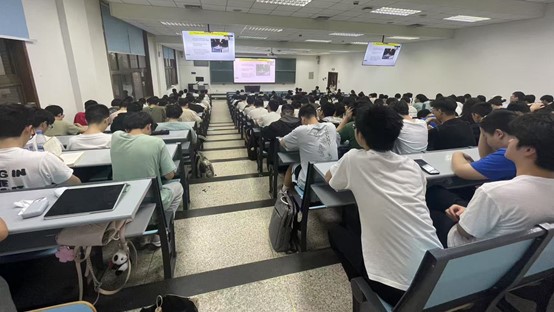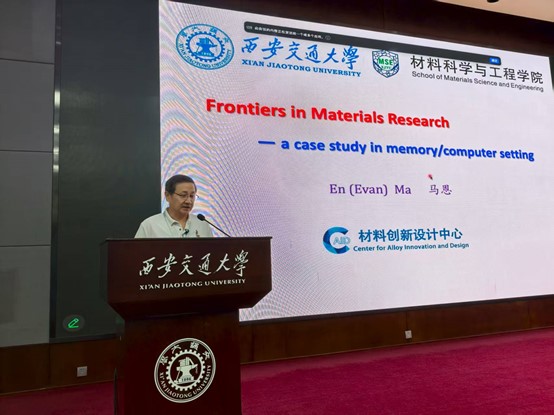Global Experts Gather to Explore Cutting-Edge Advances in Materials Science

XI’AN, China – July 5, 2025 – The 2025 Xi’an Jiaotong International Summer Session (XJTISS), co-organized by the Materials Sub-Alliance of the University Alliance of the Silk Road (UASR-MSESA) and School of Materials Science and Engineering,Xi’an Jiaotong University (XJTU-MSE), successfully concluded on July 4th. This year’s program, titled Frontiers in Materials Research, brought together world-renowned scholars and researchers to share groundbreaking insights into advanced materials science through a series of 10 full English-language thematic reports, it delved into cutting-edge research and technological applications in the field of materials science, attracting nearly 10,000 participants from home and abroad, with enthusiastic responses.

Top Scholars Lead Discussions on Frontiers of Materials Science
The course was led by internationally renowned scholars, including Evan Ma, a foreign member of the European Academy of Sciences and a professor at Xi’an Jiaotong University (expert in phase-change materials and high-entropy alloys); Upadrasta Ramamurty, an academician from Nanyang Technological University in Singapore (authority in additive manufacturing and mechanical properties of materials); and Turab Lookman, a national-level talent and professor at Xi’an Jiaotong University (pioneer in materials informatics and machine learning). Additionally, 10 distinguished scholars from institutions such as the University of Cambridge, the National University of Singapore, and the Indian Institute of Technology shared their latest research findings and future trends in areas including metallic materials, clean energy ceramics, electronic functional devices, and advanced characterization methodologies for materials.

Hybrid Online and Offline Model Drives Global Participation
The course adopted a hybrid "online + onsite" format. The onsite main venue was set up at Xi’an Jiaotong University, attracting nearly 2,000 young faculty members and students for in-person participation. Online sessions were broadcast globally via platforms such as Zoom, Voov Meeting, and Facebook, with over 4,000 logins and 5,000 cumulative views, covering universities and research institutions across Asia, Europe, North America, and more. Participants engaged in real-time interactions with experts, fully reflecting the international and open nature of the course.
Highlights of the Course Content
1. Advanced Functional Materials: Professor Evan Ma from Xi’an Jiaotong University addressed the speed and drift issues of phase-change memory devices, presenting original solutions developed at Xi’an Jiaotong University, with related research published in over 30 papers in Nature and its sub-journals. Professor Lei Hu from Xi’an Jiaotong University, starting from the fundamental theories of thermal expansion and thermal conduction, proposed innovative designs for semiconductor packaging materials, solving key challenges in integrated circuits. Professor Yu Jun Tan from the National University of Singapore demonstrated breakthrough applications of stimulus-responsive materials in soft robotics, with results featured on the covers of Science Robotics and Nature Materials.
2. Advanced Structural Materials: Academician Upadrasta Ramamurty from Nanyang Technological University systematically analyzed the regulation mechanisms of strength, ductility, and fatigue performance in additive-manufactured alloys and explored innovative applications of nanoindentation technology. Professor Jingqi Zhang from Xi’an Jiaotong University presented optimization strategies for the uniformity of 3D-printed titanium alloys, with findings published in top journals such as Science and Nature Communications. Professor Lakshmi Narayan from the Indian Institute of Technology Delhi shared additive manufacturing and mechanical testing techniques for compositionally graded joints of Inconel 718 and stainless steel 316L. Professor Xipeng Tan from the National University of Singapore, from the perspective of microstructural engineering, analyzed strategies for precise regulation of structure-property relationships in metal additive manufacturing. Dr. Shubo Gao from A*STAR in Singapore focused on process optimization for metal additive manufacturing and the development of high-performance alloys, with related technologies already driving industrial applications.
3. Frontier Interdisciplinary Fields: Professor Turab Lookman from Xi’an Jiaotong University combined machine learning and materials informatics to explain how to accelerate the discovery and design of new materials. Professor Matteo Seita from the University of Cambridge, in a "Sorby Lecture," reviewed the 160-year history of metallography and introduced his team’s low-cost microscopic characterization technology (DRM) for quality control in additive manufacturing.
After the course, participants highly praised its academic depth and organizational quality. A scholar from the National University of Singapore commented, "The reports balanced fundamental theory and practical value, providing new ideas for interdisciplinary research in materials science." A student from the School of Materials Science and Engineering at Xi’an Jiaotong University shared, "Face-to-face exchanges with world-leading scholars have greatly broadened my research horizons."
This summer school not only strengthened academic collaboration among members of the Silk Road University Alliance but also established a high-level exchange platform for global materials science researchers, further enhancing Xi’an Jiaotong University’s influence in the international materials science community. In the future, the alliance will continue to deepen such activities to drive innovation and talent development in materials science.


